BTech Artificial Intelligence and Data Science
An advanced BTech course to take you on a high-growth career path.
NIIT University (NU) has been offering Artificial Intelligence and Data Science-related courses, specializations, and industry-linked programmes since 2014. Our students have excelled both in industry and academia and continue to make a mark as able, sought-after data scientists.
Artificial Intelligence and Data Science is considered the fourth paradigm of science, after Empirical, Theoretical, and Computational paradigms. Our daily lives generate more data than ever before due to the adoption of digital technologies. With the advent of IoT (Internet of Things) and Industry 4.0, the volume of data is growing at an exponential rate. In that wealth of data, lie insights that can be used to change our world for the better. This has led to the matured discipline of Artificial Intelligence and Data Science that involves collection, visualization, processing and modelling of large and complex data sets from different domains and sources.
NU’s BTech Programme in Artificial Intelligence and Data Science is a winning combination of more than eight years of experience in the field combined with insights from trends across academic institutions and industry.
The BTech Artificial Intelligence and Data Science course will give students the knowledge, skills and tools needed to handle complex data from all possible domains. It is a 4-year undergraduate programme that prepares students to acquire, manage, and elicit meaning from data for improved decision-making in the business world.

BTech Artificial Intelligence and Data Science – Distinguishing Features
Like all our other flagship programmes, the BTech Artificial Intelligence and Data Science course is designed around NU’s core principles of providing industry-linked, technology-based, research-driven and seamless education.
Our BTech Artificial Intelligence and Data Science programme is an advanced course that puts you into a high-growth journey. Here’s how:
Consistent with our core principle of industry-linkage, the hallmark of the NU B Tech Artificial Intelligence and Data Science programme is its deep rootedness into industry. Industry professionals work as mentors along with NU faculty giving our students the dual advantage of academic rigor and industry relevance. The curriculum has been designed by faculty, data scientists and industry subject matter experts.
We are very impressed with both the skills and attitude of NU graduates who have gone through the Analytics and Cognitive (Data Science) programme. They demonstrate terrific aptitude and attitude towards learning. We need more such graduates and they are performing significantly above the mass hired engineering graduates we hire from the top engineering institutions. The curriculum for the program is jointly designed by IBM (Cognitive group) and NU faculty and reflects the dynamic and changing requirements in the market place.” — Vijay Muralidaran, Data Science Leader, Cognitive & Advance Analytics CIC, IBM.
The programme offers an immersive experience. Students of BTech Artificial Intelligence and Data Science work on two capstone projects, one research & development project, and engage in a 6-month long Industry Practice.
Faculty in the BTech Artificial Intelligence and Data Science course at NU are from well-known universities like IIT-ISM Dhanbad; Missouri University of Science and Technology, Missouri, USA; Ohio University, Ohio, USA; and University of Minnesota, Minneapolis, USA. Our faculty comes with rich prior work experience in teaching, research, industry and the government. Their research has been published in several international journals and conference proceedings. Our faculty members have been preparing industry-ready BTech Data Science specialists for more than six years.
Several unique teaching methods are integrated into the project-based learning approach at NU. This approach helps students to develop independent learning skills and builds a deeper understanding of subjects.
BTech Artificial Intelligence and Data Science – Course Outline
Students at NU’s BTech Artificial Intelligence and Data Science programme must complete a total of 176 credits spread over 39 courses and 2 Capstone Projects, 1 R&D Project and 1 Industry Practice in Data Science and related subject areas to obtain a BTech degree in Artificial Intelligence and Data Science.
| Course category | Credits |
|---|---|
| Mathematics and Basic Sciences (MBS) | 20 |
| Engineering Sciences (ESC) | 14 |
| Humanities and Social Sciences (HSS) | 18 |
| Professional Core Course (PCC) | 28 |
| Data Science Core Course (DS) | 32 |
| Professional Electives Course (PEC) | 20 |
| Open Electives Course (OEC) | 12 |
| Project Work, Internship and Industry Practice (PRJ) | 32 |
| Environmental Sciences (EVS) | Audit Course |
| Total credits | 176 |

List of Professional Elective Courses in Artificial Intelligence and Data Science
01.
02.
03.
04.
05.
06.
07.
08.
09.
10.
11.
12.
13.
14.
15.
16.
17.
18.
19.
20.
21.
BTech Data Science Course Syllabus & Structure
Year I (Semester I & Semester II)
| # | Course code | Course | L | T | P | C |
|---|---|---|---|---|---|---|
|
1 |
MAT 112 | Calculus | 3 | 1 | 0 | 4 |
|
2 |
Science – I | 3 | 0 | 2 | 4 | |
|
3 |
EL 111 | Fundamentals of Electronics | 3 | 0 | 2 | 4 |
|
4 |
TA 111 | Fundamentals of Computer Programming | 2 | 0 | 4 | 4 |
|
5 |
TA 202/ TA 212 | Engineering Graphics / Workshop Practice | 2/1 | 0 | 2/4 | 3 |
|
6 |
TA 102 | Communication Skills | 2 | 0 | 2 | 3 |
|
7 |
NU 111 | Community Connect | 0 | 0 | 2 | 1 |
| Total Semester L-T-P-C | 13 | 1 | 12 | 23 |
| # | Course code | Course | L | T | P | C |
|---|---|---|---|---|---|---|
| 1 | MAT 101 | Algebra and Differential Equations | 3 | 1 | 0 | 4 |
| 2 | Science – II | 3 | 0 | 2 | 4 | |
| 3 | CS 102 | Data Structures | 3 | 0 | 2 | 4 |
| 4 | EL 101 | Digital Logic and Circuit | 3 | 0 | 2 | 4 |
| 5 | TA 212/ TA 202 | Workshop Practice/Engineering Graphics | 2/1 | 0 | 4/2 | 3 |
| 6 | HSSM-I | 3 | 0 | 0 | 3 | |
| 7 | NU 111 | Community Connect | 0 | 0 | 2 | 1 |
| 8 | Total Semester L-T-P-C | 15 | 1 | 10 | 24 |
Year II (Semester III & Semester IV)
| # | Course code | Course | L | T | P | C |
|---|---|---|---|---|---|---|
| 1 | MAT 221 | Probability & Random Process | 3 | 1 | 0 | 4 |
| 2 | CS 122 | Computer Architecture and Organization | 3 | 0 | 2 | 4 |
| 3 | CS 201 | Design and Analysis of Algorithms | 3 | 0 | 2 | 4 |
| 4 | CS 232 | Discrete Mathematics | 3 | 1 | 0 | 4 |
| 5 | CS 251 | Object Oriented Programming | 2 | 0 | 4 | 4 |
| 6 | CS 322 | Artificial Intelligence | 3 | 0 | 2 | 4 |
| 7 | NU 211 | Community Connect | 0 | 0 | 2 | 1 |
| Total semester L-T-P-C | 17 | 2 | 12 | 25 |
| # | Course code | Course | L | T | P | C |
|---|---|---|---|---|---|---|
| 1 | CS 231 | Database Management Systems | 3 | 0 | 2 | 4 |
| 2 | EL 302 | Digital Image Processing | 3 | 0 | 2 | 4 |
| 3 | CS 211 | Operating Systems | 3 | 0 | 2 | 4 |
| 4 | DS 412 | Inferential Statistics for Data Science | 3 | 0 | 2 | 4 |
| 5 | CS 212 | Computer Networks and Data Communication | 3 | 0 | 2 | 4 |
| 6 | CS 4131 | Machine Learning | 3 | 0 | 2 | 4 |
| 7 | NU 212 | Community Connect | 0 | 0 | 2 | 1 |
| Total semester L-T-P-C | 18 | 0 | 14 | 25 |
Year III (Semester V & Semester VI)
| # | Course code | Course | L | T | P | C |
|---|---|---|---|---|---|---|
| 1 | DS 401 | Numerical Methods for Data Science | 3 | 1 | 0 | 4 |
| 2 | CS 3132 | Cloud Computing Concepts (from CSE PE – Sem-VI) | 3 | 0 | 2 | 4 |
| 3 | CS 4261 | Natural Language Processing & Text Analytics | 3 | 0 | 2 | 4 |
| 4 | CS 4101 | Introduction to Linear and Non-linear Optimization (OE) | 3 | 1 | 0 | 4 |
| 5 | DS 432 | Predictive Modeling for Data Science | 3 | 0 | 2 | 4 |
| 6 | HSSM-II | 3 | 0 | 0 | 3 | |
| 7 | NU 311 | Community Connect | 0 | 0 | 2 | 1 |
| Total semester L-T-P-C | 18 | 2 | 8 | 24 |
| # | Course code | Course | L | T | P | C |
|---|---|---|---|---|---|---|
| 1 | CS 3102 | Dimensional and NoSQL Databases | 2 | 0 | 4 | 4 |
| 2 | Professional Elective – I | 3 | 0 | 2 | 4 | |
| 3 | Professional Elective – II | 3 | 0 | 2 | 4 | |
| 4 | CS 392 | Capstone Project – I | 2 | 0 | 4 | 4 |
| 5 | NU 302 | R & D Project | 1 | 0 | 6 | 4 |
| 6 | HSSM-III | 3 | 0 | 0 | 3 | |
| 7 | NU 312 | Community Connect | 0 | 0 | 2 | 1 |
| Total semester L-T-P-C | 14 | 0 | 20 | 24 |
Year IV (Semester VII &Semester VIII)
| # | Course code | Course | L | T | P | C | |
|---|---|---|---|---|---|---|---|
| 1 | Professional Elective – III | 2 | 0 | 4 | 4 | ||
| 2 | Professional Elective – IV | 3 | 0 | 2 | 4 | ||
| 3 | Professional Elective – V | 2 | 0 | 4 | 4 | ||
| 4 | Open Elective – II | 3 | 0 | 2 | 4 | ||
| 5 | Open Elective – III | 3 | 0 | 2 | 4 | ||
| 6 | CS 4191 | Capstone Project — II | 2 | 0 | 4 | 4 | |
| 7 | NU 312 | Community Connect | 0 | 0 | 2 | 1 | |
| Total semester L-T-P-C | 15 | 0 | 20 | 25 |
| # | Course Code | Course Title | L | T | P | C |
|---|---|---|---|---|---|---|
| 1 | NU402 | Industry Practice / Project | 0 | 0 | 4 | 20 |
| Total semester L-T-P-C | 0 | 0 | 4 | 20 |
Programme outcomes
PO1
Engineering knowledge
Apply the knowledge of Mathematics, Science, fundamentals of Engineering and an engineering specialisation to the solution of complex engineering problems.
PO2
Problem analysis
Identify, formulate, review research literature, and analyse complex engineering problems to reach substantiated conclusions using first principles of Mathematics, Natural Sciences, and Engineering Sciences.
PO3
Design/Develop solutions
Design solutions for complex engineering problems and system components or processes that meet specified needs with appropriate consideration for public health and safety, and cognisant of cultural, societal, and environmental considerations.
PO4
Conduct investigations of complex problems
Use research-based knowledge and research methods including design of experiments, analysis and interpretation of data, and synthesise information to provide valid conclusions.
PO5
Modern tool usage
Create, select, and apply appropriate techniques, resources, and modern engineering and IT tools including prediction and modelling to complex engineering activities with an understanding of the limitations.
PO6
The engineer and society
Apply reasoning informed by contextual knowledge to assess societal, health, safety, legal and cultural issues, and the consequent responsibilities relevant to the professional engineering practice.
PO7
Environment and sustainability
Understand the impact of professional engineering solutions in societal and environmental contexts, and demonstrate the knowledge of, and need for sustainable development.
PO8
Ethics
Apply ethical principles and commit to professional ethics and responsibilities and norms of the engineering practice.
PO9
Individual and teamwork
Function effectively as an individual, and as a member or leader in diverse teams, and in multidisciplinary settings.
PO10
Communication
Communicate effectively on complex engineering activities with the engineering community and with society at large. This includes being able to comprehend and write effective reports and design documentation, make effective presentations, and give and receive clear instructions.
PO11
Project management and finance
Demonstrate knowledge and understanding of engineering and management principles and apply these to one’s own work, as a member and/or leader in a team, to manage projects in multidisciplinary environments.
PO12
Life-long learning
Recognise the need for, and have the preparation and ability to, engage in independent and life-long learning in the broadest context of technological change.

Programme Specific Outcomes for Data Science
PSO1












